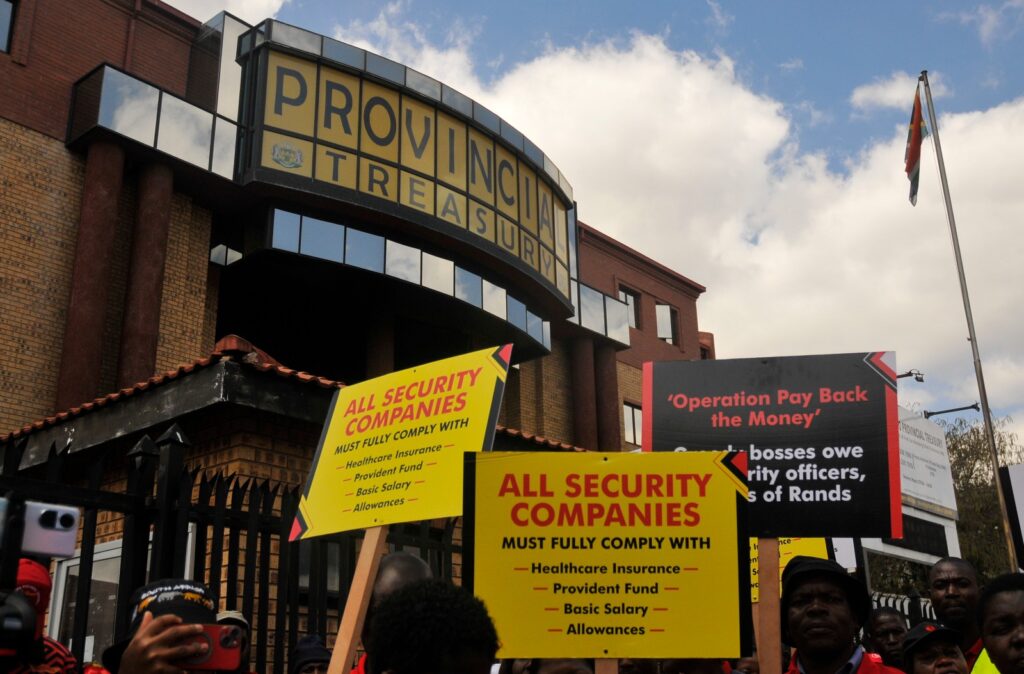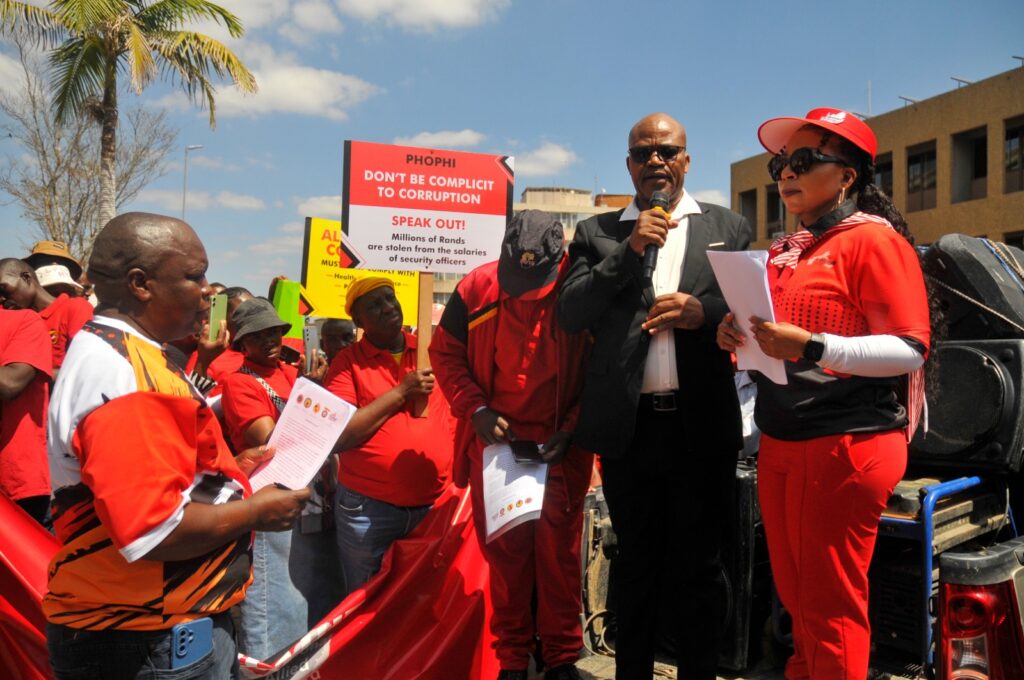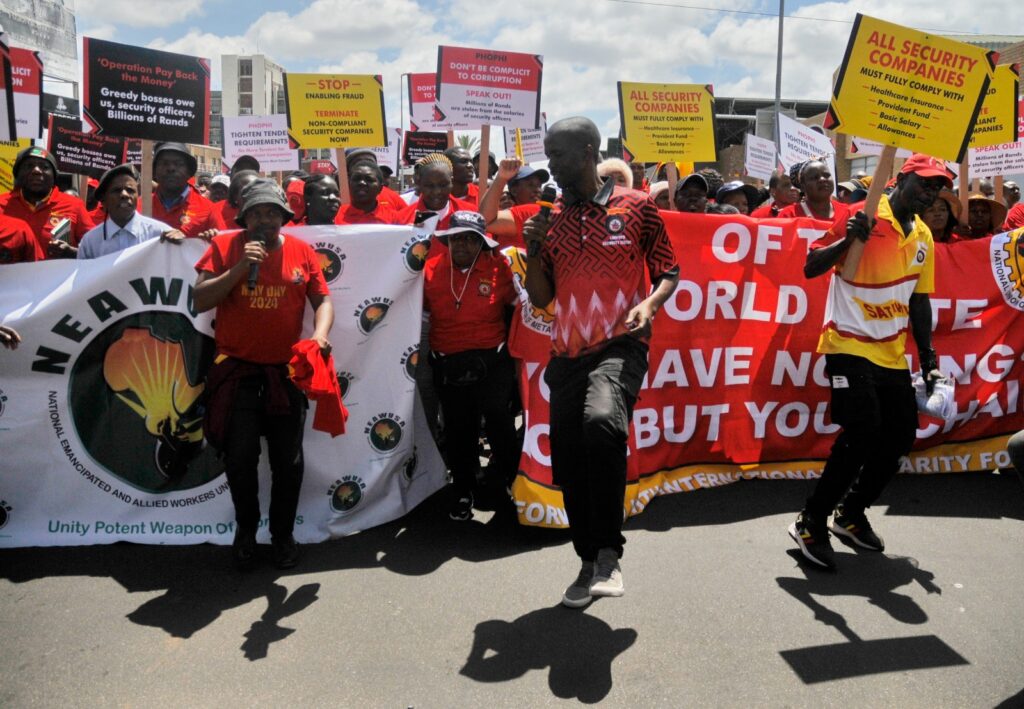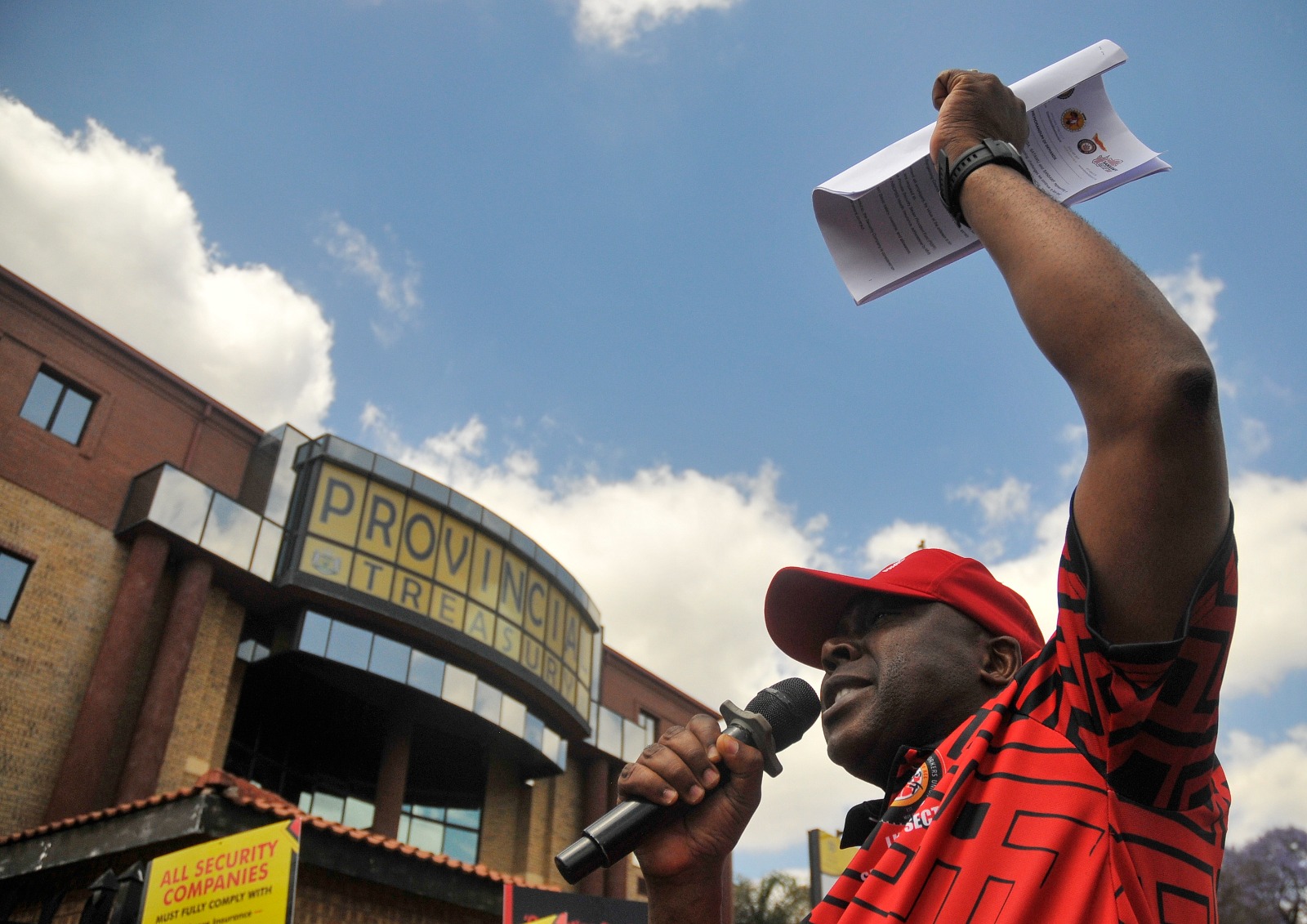Unions organising in the private security sector have warned they will petition President Cyril Ramaphosa to authorise a Special Investigating Unit (SIU) probe into provincial departments awarding contracts to non-compliant companies.
In the latest round of protests against rogue companies that deduct millions from workers but fail to pay their health and other benefits, trade unions representing thousands of security officers have accused the Limpopo provincial government of enabling large-scale exploitation in the private security industry.
Members of the Democratic Transport Allied Workers Union (DETAWU), the African Workers Union (AWU), the South African Transport and Allied Workers Union (SATAWU), the National Union of Metalworkers of South Africa (NUMSA), and the South African National Security and Allied Workers Forum (SANSAWF) handed over separate memoranda of demands to Premier Dr Phophi Ramathuba and the Limpopo Provincial Treasury.

The unions accuse the provincial government of complicity in perpetuating the exploitation of security officers by continuing to award contracts to companies that ignore labour laws.According to the unions, hundreds of private security companies contracted by the provincial government have failed to comply with the Main Collective Agreement (MCA) of the National Bargaining Council for the Private Security Sector (NBCPSS).
This collective agreement, gazetted in February 2020 and extended to non-parties in December 2022, requires employers to provide security officers with basic salaries, overtime pay, allowances, healthcare insurance, and provident fund contributions.
Despite deductions from employees’ salaries for provident fund and medical aid contributions, many security companies allegedly failed to remit these payments to the relevant service providers, leaving workers without access to essential benefits.
“The problem of non-compliance in the private security industry is historic and at a crisis level, with Limpopo being one of the provinces incubating non-compliance,” said DETAWU General Secretary Vusi Ntshangase. “We have had situations where widows could not claim provident fund benefits because companies were not paying over contributions. Some workers cannot access healthcare benefits even though deductions appear on their payslips,” Ntshangase said.
The unions stated that non-compliance remains one of the core issues that led to the formation of the bargaining council, yet government departments continue to award tenders to delinquent companies that disregard labour laws and collective agreements.
In the memorandum to the provincial treasury, at least 862 security companies operating in Limpopo are non-compliant with provident fund and health insurance obligations. The unions argue that this constitutes a sophisticated form of theft, as it denies workers healthcare and retirement benefits while enriching company owners through dividends and bonuses.

Workers who spoke to Mukurukuru Media corroborated the allegations, describing irregularities in salary payments and benefits. Other workers, speaking on condition of anonymity for fear of reprisals, said they are still paid outdated salaries, forced to buy uniforms themselves, and denied proper holiday pay. Some revealed that their companies recently deducted provident fund contributions without explanation, leaving employees uncertain whether the funds were submitted to the designated service providers.
“Forcing workers to choose between buying food and paying for hospital care must end,” Ntshangase said. “Government must be an active player in pushing back against the frontiers of non-compliance. It cannot be a spectator while workers are being robbed.”
The unions are demanding immediate action from both the Premier’s office and the Limpopo Provincial Treasury. They call for the termination of all contracts with non-compliant companies, an audit of existing security contracts to ensure compliance with the MCA, the Labour Relations Act, PSIRA, the Private Security Industry Regulation Act, the Pension Funds Act, and other applicable legislation.
They also want procurement processes tightened to ensure that only companies with valid letters of good standing from the NBCPSS, the Private Security Industry Regulatory Authority (PSIRA), and the Private Security Sector Provident Fund (PSSPF) are eligible for government tenders. Public accountability is a key demand, including publishing a list of security service providers and their compliance status, and enforcing consequence management against officials who fail to ensure compliance.
Ntshangase said the campaign against non-compliance has been ongoing for almost two years and has already reached several provinces, including KwaZulu-Natal, the Eastern Cape, Northwest, and Mpumalanga. Limpopo, he said, is one of the most affected regions, with systemic violations putting workers and their families at risk.

“We shall not rest until non-compliance in the industry is eradicated. We are fed up with this situation,” Ntshangase said. “As progressive trade unions, we will never apologise for asserting workers’ constitutional rights and demanding a better life for our members. This includes quality healthcare, provident funds, a minimum wage, overtime pay, and allowances as stipulated by law and the MCA.”
Workers and unions alike emphasised that restoring compliance is not just a matter of fairness but also a precondition for effective security services. Poorly paid security officers, denied healthcare or provident fund contributions, are more vulnerable to injury, illness, and financial instability, which can compromise the safety of government facilities and the general public.
“This is fraud at a grand scale, and it is not acceptable,” the unions say in the memorandum to the premier’s office. “The provident fund of security officers, their healthcare, and their basic income are essential prerequisites for their livelihood and productivity, and protecting them is a function of fulfilling the National Democratic Revolution and upholding the dignity of all citizens.”
As the unions await a response from the provincial government, security officers continue to voice frustration at being caught in the middle of what they describe as white-collar theft that threatens their families’ survival, highlighting the urgent need for reform and accountability in the provincial government’s security procurement practices.
Rudzani Murovhi, a senior director in Ramathuba’s office delegated to accept the memorandum, said the issues in the memorandum would be attended to, and that a meeting with union leadership would be scheduled “within a short period of time.” – news@mukurukuru.co.za

Be First to Comment